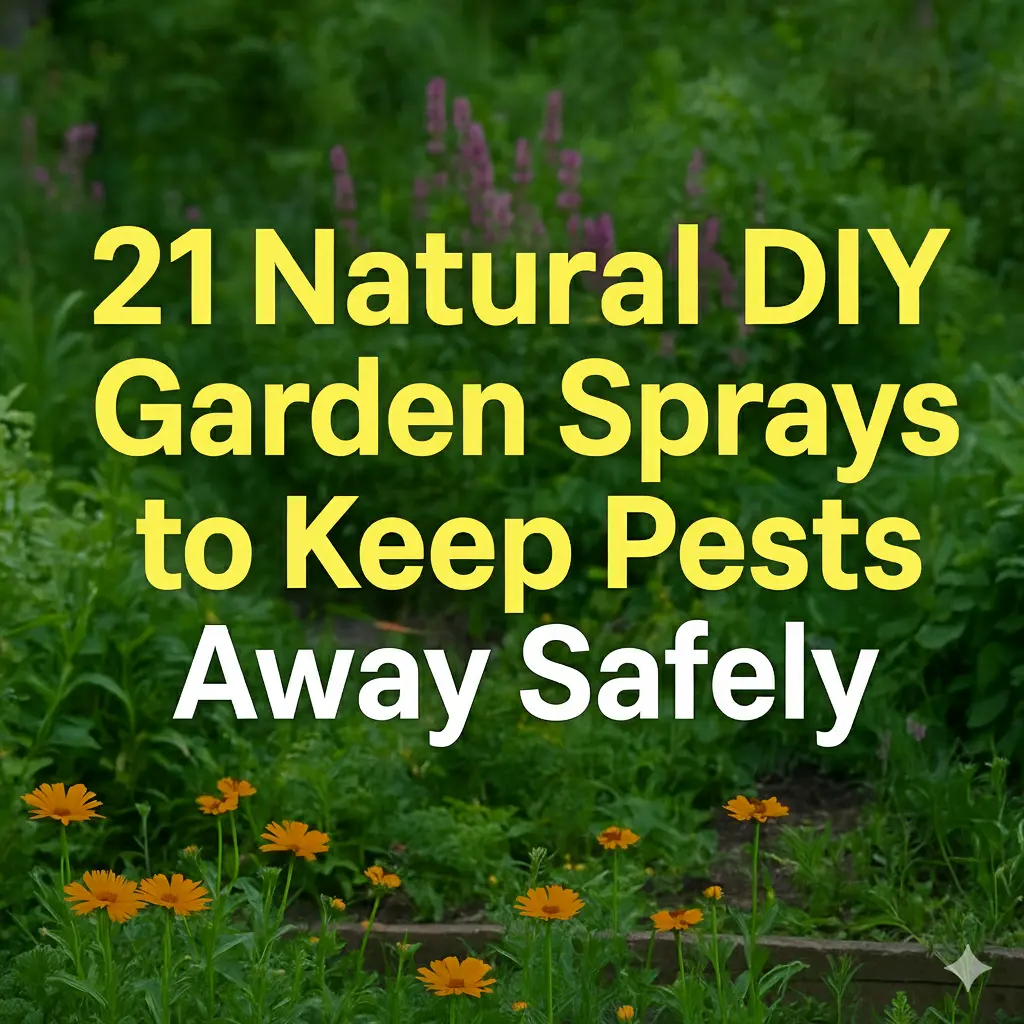Keeping your garden healthy and pest-free doesn’t have to mean using harsh chemicals. Nature provides plenty of safe, effective alternatives that you can make right at home. From garlic and chili sprays to fragrant herbs and even kitchen scraps, these natural DIY garden sprays help protect your plants while being gentle on the environment. Whether you’re dealing with aphids, slugs, or ants, these simple recipes are easy to prepare and surprisingly effective.
1. Garlic Spray
Garlic isn’t just great in the kitchen; it’s also a natural pest repellent. To make it, blend a few cloves with water, strain, and spray directly on your plants. The strong smell helps keep insects like aphids and caterpillars at bay. If you’ve ever crushed garlic for dinner and had the smell stick to your hands, you know exactly why bugs avoid it.
2. Soap and Water Spray
A simple mix of liquid dish soap and water works wonders against soft-bodied insects like mites and whiteflies. Just spray the leaves where the pests usually gather. One time I had a plant nearly covered in aphids, and after a couple of treatments with soap spray, they were gone within a week. Just don’t go too heavy on the soap, or it may harm delicate leaves.
3. Neem Oil Spray
Neem oil is like the superhero of natural garden sprays. Mix a few drops with water and a little soap to help it spread evenly. Spray on leaves to deter a wide range of pests, from beetles to caterpillars. I started using it after noticing chew marks on my basil, and it saved the plant before it was completely eaten.
4. Chili Pepper Spray
If pests don’t leave after garlic, chili pepper spray will usually do the trick. Blend fresh or dried chili peppers with water, strain, and spray it on the plants. It’s like adding a spicy barrier that bugs can’t stand. Just remember to wear gloves while making it—I learned the hard way when I rubbed my eyes after chopping chili.
5. Vinegar Spray
Vinegar is great for discouraging ants and some other pests from sticking around. Mix equal parts vinegar and water and spray around the base of your plants or garden paths. I use it near my garden edges, and it helps keep ants from marching straight up into my vegetables. Avoid spraying directly on leaves though, since it can damage them.
6. Essential Oil Spray
A few drops of essential oils like peppermint, rosemary, or lavender mixed with water make a fragrant but effective spray. Bugs dislike the strong scents, but for us, it makes the garden smell even better. I especially love peppermint oil because it not only keeps pests away but also makes the whole garden feel refreshing.
7. Tomato Leaf Spray
Tomato plants naturally contain compounds that repel insects. Chop up some tomato leaves, soak them in water overnight, and strain before spraying on plants. I tried this when my lettuce was under attack, and it surprisingly worked. Plus, it felt like recycling something that would have otherwise gone to waste.
8. Cucumber Peel Spray
Cucumber peels are surprisingly effective against ants and some beetles. Boil a handful of peels in water, let it cool, strain, and spray around plants. I once noticed ants swarming my strawberry patch, and after using cucumber peel spray along the edges, they practically vanished overnight. It’s a simple, kitchen-waste-friendly solution.
9. Onion Spray
Onions have a strong odor that many pests find offensive. Blend an onion with water, strain, and spray it on leaves and stems. I tried this when my spinach was under siege by aphids, and it worked like a charm. A practical tip: use it in the evening to avoid the sun intensifying the onion smell.
10. Beer Trap Spray
For slugs and snails, beer is magic. Pour a little beer into a shallow container and place it near plants. The pests are attracted, fall in, and can’t escape. I set this up once for my garden lettuce, and it cleared out the slugs within a couple of nights. Bonus: it’s much safer than chemical slug pellets.
11. Hot Pepper and Garlic Combo Spray
Combine the power of garlic and hot peppers for a double-action repellent. Blend both with water, strain, and spray thoroughly on vulnerable plants. I use this mix on my tomato plants every couple of weeks, and it keeps caterpillars and aphids from even thinking about settling in.
12. Baking Soda Spray
Baking soda is excellent for preventing fungal infections and some pests. Mix a tablespoon with water and a few drops of liquid soap, then spray on leaves. I had a mild powdery mildew outbreak on my zucchini, and regular baking soda sprays stopped it in its tracks. It’s gentle but surprisingly effective.
13. Eucalyptus Spray
Eucalyptus leaves or essential oil can help repel mosquitoes and some garden pests. Crush leaves or mix a few drops of oil with water for a spray. I keep a small eucalyptus spray on hand because it not only protects plants but also gives a pleasant aroma while I work in the garden.
14. Sage and Rosemary Spray
Herbs like sage and rosemary aren’t just for cooking—they can act as natural insect repellents too. Steep fresh leaves in hot water, let cool, strain, and spray. I tried this in my herb garden, and the pests quickly learned to avoid it. Plus, it’s nice to have the scent of fresh herbs filling the garden while keeping bugs away.
15. Lavender Spray
Lavender is a natural insect deterrent, especially for moths, flies, and fleas. Steep fresh or dried lavender in hot water, let it cool, strain, and spray around your plants. I love using it near my garden seating area—it keeps bugs away and makes the air smell amazing.
16. Mint Spray
Mint is a powerful repellent for ants, aphids, and flea beetles. Chop fresh mint leaves, steep them in hot water, strain, and spray on plants. I once had a mint patch near my tomatoes, and pests completely stayed away from the neighboring plants when I sprayed this mixture.
17. Lemon Spray
The acidic scent of lemon deters many insects. Mix lemon juice with water and a few drops of soap, then spray on affected plants. I use this whenever I notice ants near my herbs, and it works better than I expected. Just avoid spraying in direct sunlight to prevent leaf burn.
18. Chamomile Spray
Chamomile can help protect seedlings from pests and fungal infections. Brew a strong chamomile tea, let it cool, and spray directly on young plants. I tried this on my lettuce seedlings, and not only did it repel pests, but it seemed to give the plants a little boost too.
19. Rosemary and Garlic Spray
Combine rosemary and garlic for a potent all-around pest deterrent. Crush rosemary leaves and garlic, steep in water overnight, strain, and spray. I use this on my vegetable garden in spring, and it keeps caterpillars and beetles away while leaving my plants healthy.
20. Peppermint and Soap Spray
Peppermint oil combined with a few drops of soap makes a strong bug repellent. Mix with water and spray on leaves and soil around plants. I keep this on hand during summer, and it works wonders against ants and aphids without harming my vegetables.
21. Cornmeal Trap Spray
Cornmeal isn’t sprayed directly but used as a natural bait for ants and some pests. Sprinkle it lightly around plant bases or in garden paths. Ants carry it back to their colony, and it gradually helps reduce their numbers. I tried this near my tomato plants, and it noticeably reduced ant activity after a week.
Using natural DIY sprays in your garden is a practical and eco-friendly way to keep pests at bay. Not only do they protect your plants, but they also let you enjoy a healthier, chemical-free garden. By experimenting with these sprays, you can find the combinations that work best for your plants and enjoy a thriving garden without compromising safety or flavor. With a little creativity and consistency, pest-free gardening is completely achievable.


